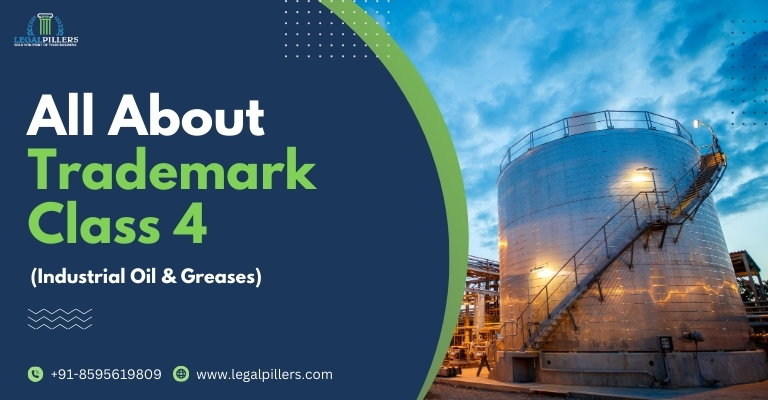
Table of Contents
All About Trademark Class 4
Class 4 is a category of the trademark under the Nice Classification system that encompasses various goods related to industrial oils and greases, fuels, and illuminants. It includes items such as motor oils, lubricants, waxes for industrial purposes, and various types of fuels, including gasoline, diesel fuel, and kerosene. Additionally, this class covers candles and wicks for lighting purposes, as well as certain types of non-chemical fuel additives. Essentially, Class 4 is primarily focused on products associated with energy, lighting, and lubrication in industrial and commercial applications.
Important goods included in Trademark Class 4
The important goods that have been included in this trademark class are as follow-
-
Industrial Oils and Greases:
This category includes various types of oils and greases used in industrial applications, such as motor oils, engine lubricants, hydraulic oils, gear oils, and compressor oils.
-
Lubricants:
Aside from industrial lubricants, this category includes products like greases for machines, anti-friction preparations, and lubricating oils for vehicles and machinery.
-
Dust Absorbing, Wetting, and Binding Compositions:
This subcategory includes dust control and binding agents used in industrial settings.
-
Fuels:
Class 4 encompasses different types of fuels, including gasoline, diesel fuel, kerosene, biofuels, and other combustible materials used for energy production and transportation.
-
Illuminants:
Products related to lighting and illumination are covered, such as candles, wicks for candles, lamp oil, and other lighting materials.
-
Mineral and Synthetic Waxes:
Products like paraffin wax and other mineral or synthetic waxes used for industrial and commercial purposes.
List of popular examples of this Trademark Class
- Bharat Petroleum: Petrol, diesel, gas, fuel oil, industrial oils, greases, lubricants, other fuels, and illuminants.
- Gail: Fuels
- Servo India Oil: Industrial oils & greases, lubricants, etc.
- Hindustan Petroleum: Industrial oils & greases, lubricants, fuels, etc.
- Reliance: Industrial oils & greases, lubricants, fuels, illuminants, etc.
- Shell: Industrial oils & greases, lubricants, etc.
- Valvoline: Lubrication oils & greases.
- Castrol: Oils for lubricating, lighting and heating.
- Veedol: Lubricants & greases
- Gulf: Petroleum and its products
- Motul: Industrial oils & greases; lubricants, and fuels.
- Elf: Petroleum products.
- Honda: Industrial oils & greases, lubricants, etc.
- Suzuki: Lubricating oils for industrial combusting engines.
List of goods included in Trademark Class 4
A
- Additives, non-chemical, to motor fuel
- Alcohol (fuel)
- Anthracite
B
- Beeswax for use in the manufacture of cosmetics
- Beeswax
- Belting wax
- Benzene fuel
- Benzine
- Biomass fuel
- Bone oil for industrial purposes
C
- Candles/ tapers
- Carburants/ motor fuel
- Carnauba wax
- Castor oil for industrial purposes
- Ceresine
- Charcoal (fuel)
- Christmas tree candles
- Coal
- Coal briquettes
- Coal dust (fuel)
- Coal naphtha
- Coal tar oil
- Coke
- Combustible briquettes
- Cutting fluids
D
- Dielectric oil for use in metalworking
- Diesel oil/ gas oil
- Dust absorbing compositions
- Dust binding composition for sweeping
- Dust laying compositions
- Dust removing preparations
E
- Electric energy
- Ethanol (fuel)
F
- Firelighters
- Firewood
- Fish oil for industrial purposes
- Fuel
- Fuel gas
- Fuel oil/ combustible oil
- Fuel with an alcohol base
G
- Gas for lighting’
- Gear oil
- Grease for arms (weapons)
- Grease for belts
- Grease for footwear
- Grease for leather
- Greases for the preservation of leather
H
- Hookah charcoal
- Hydrogen fuel
I
- Industrial grease
- Industrial oil
- Industrial wax
K
- Kerosene
L
- Lamp wicks
- Lanolin for use in the manufacture of cosmetics
- Lighting fuel
- Lignite
- Ligroin
- Lubricants
- Lubricating graphite
- Lubricating grease
- Lubricating oil
M
- Mazut
- Methylated spirit
- Mineral fuel
- Moistening oil
- Motor oil
N
- Naphtha
- Nightlights (candles)
- Non-slipping preparations for belts
O
- Oil-gas
- Oils for lighting
- Oils for paints
- Oils for releasing form work (building)
- Oils for the preservation of leather
- Oils for the preservation of masonry
- Oleine
- Ozokerite/ ozocerite
P
- Paper spills for lighting fires
- Paraffin
- Peat (fuel)
- Peat briquettes (fuel)
- Perfumed candles
- Petrol/ gasoline
- Petroleum ether
- Petroleum jelly for industrial purposes
- Petroleum, raw or refined
- Producer gas
R
- Rape oil/ colza oil for industrial purposes
S
- Solidified gases (fuel)
- Soy candles
- Soya bean oil preparations for non-stick treatment of cooking utensils
- Stearine
- Sunflower oil for industrial purposes
T
- Tallow
- Textile oil
- Tinder
V
- Vaporized fuel mixtures
W
- Wax (raw material)
- Wax for lighting
- Wax for skis
- Wicks for candles
- Wood briquettes
- Wood chips for smoking & flavoring foods
- Wood chips for use as fuel
- Wood shavings for lighting fires
- Wool grease/ lanolin
X
- Xylene fuel
Conclusion
Class 4 is a crucial category of trademark within the Nice Classification system, encompassing a broad range of goods related to industrial oils, fuels, and products used for lighting, heating, lubrication, and power generation. Registering a trademark can provide businesses with valuable benefits, including brand protection, exclusive rights, market credibility, legal recourse against infringement, and global protection. It also serves as a deterrent to potential infringers, adds asset value, and opens up licensing opportunities. If your business operates in the field of industrial oils, fuels, or related products, securing a trademark in Class 4 can be a strategic step to safeguard your brand’s identity and market position while ensuring legal protection for your offerings.
LegalPillers is here to help you to reduce the complications of classification & registration of the Trademark, make sure that your brand has been safeguarded within this trademark class.
(FAQs) about Class 4 Trademark
What is Class 4 trademark?
- It is one of the 45 classes used to categorize and register trademarks for goods. It specifically covers industrial oils and greases, fuels, and related products.
What are some common products in Class 4?
- Common products in Class 4 include motor oils, lubricants, waxes, fuels (such as gasoline and diesel), candles, and wicks.
Why is it important to classify trademarks into specific classes?
- Classification helps in organizing trademarks based on their nature of goods or services, making it easier for trademark offices and businesses to manage and protect intellectual property.
How can I determine if my product belongs to Class 4?
- Review the description and specifications of your product. If it falls under industrial oils, greases, fuels, or related categories, it may belong to Class 4.
Can I register a trademark in multiple classes, including Class 4?
- Yes, you can register a trademark in multiple classes if your product or service spans multiple categories. This allows broader protection.
What is the Nice Classification system?
- The Nice Classification is an international system used to categorize trademarks into classes. It simplifies the process of registering trademarks globally.
How do I apply for a trademark in Class 4?
- You can apply for a trademark in Class 4 through your country’s trademark office. It is advisable to seek legal counsel for the application process.
What is the duration of trademark protection in Class 4?
- Trademark protection typically lasts 10 years, but it can be renewed indefinitely as long as you continue to use and maintain the mark.
Can I use a registered trademark symbol (®) with my trademark covered under class 4?
- You can use the ® symbol only after your trademark is officially registered. Until then, you can use ™ to indicate your claim to the mark.
Can I license my Class 4 trademark to other businesses?
- Yes, you can license your trademark to other businesses, allowing them to use it in connection with the specified goods in Class 4.
What happens if someone infringes on my Class 4 trademark?
- You have the legal right to take action against trademark infringement, which may include legal proceedings to protect your mark.
Is it possible to lose trademark protection in Class 4?
- Yes, if you fail to renew your trademark or if it becomes generic or abandoned, you may lose protection.
Can a Class 4 trademark be challenged or opposed by others?
- Yes, other parties can oppose the registration of a Class 4 trademark if they believe it conflicts with their existing marks.
Are there international treaties that govern Class 4 trademarks?
- Yes, the Paris Convention and the Madrid Protocol are international treaties that provide trademark protection across multiple countries.
Can I register a trademark for a brand name and a logo together in Class 4?
- Yes, you can register both a wordmark (brand name) and a logo in Class 4, providing comprehensive protection.
What should I do if my trademark is no longer in use?
- It is essential to continue using your trademark. Non-use for an extended period may lead to abandonment.
Can I sell my trademark covered under class 4a?
- Yes, you can sell or transfer your trademark to another party, subject to legal regulations and procedures.
How long does it take to register a trademark under class 4?
- The duration varies by country but can take several months to a couple of years, depending on the complexity of the application.
Do I need legal assistance to register a Class 4 trademark?
- While it is not mandatory, it is highly advisable to consult with a trademark attorney to navigate the registration process successfully.
What are the benefits of registering a trademark in Class 4?
- Registering a trademark in Class 4 provides legal protection, exclusive rights to use the mark, and the ability to enforce those rights against infringers, which can help protect your brand and business interests.


Leave a Reply